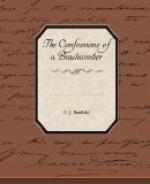If the reader will take the trouble to scan the revised chart of the Island, he will notice on the eastern coast an indentation entitled “Panjoo,” which, in the language of the blacks, seems to indicate “nice place.” A steep grassy slope comes down to the sea, separated therefrom by a line of pandanus palms. To the north is a jungle-covered spur, along the foot of which is a palm-tree gully; to the south a ridge with low-growing, wind-bent acacias. The gully enters the boulder-strewn inlet under the shade of much leafage. The great Pacific gurgles at the base of giant rocks, among which a ragged palm (CARYOTA) bears immense bunches of yellow insipid fruit, each containing two coffee-like berries. Panjoo is a favourite objective, for it may be approached from various directions, each pleasant, but as a resort for a crocodile it is about as unpromising a locality as could be imagined.
Thither one bright November morning we ("Paddy,” the most silent and alert of black boys, and myself) went. The tide was out, and we found a comparatively easy track close to the margin of the sea, having occasionally to wade through shallow pools and to clamber over rocks thickly studded with limpets.
Years gone by a huge log of pencil cedar had been cast among the boulders at Panjoo, and as I looked at the log “Paddy” with a start indicated the presence of a novelty—a crocodile apparently in repose, with its head in the shadow of a boulder. I was carrying a pea rifle more for company than for anything else; for “Paddy,” though of a most cheerful disposition, never made remarks. His conversation for the most part was compounded of eloquent looks and expressive gestures. A monosyllable to him was a laborious sentence; four or five words a speech. Once upon a time, it is said, a youthful German inadvertently blundered into a railway carriage reserved for Moltke. The glare of the great man brought three words of respectful apology for the intrusion. The great man exclaimed with an air of exasperated boredom—“Insufferable talker!”—of course, all in German. “Paddy,” like Moltke, was, averse from speech, unless when speech was absolutely vital. The presence of a 10-foot crocodile of unknowledgeable ferocity was a vital occasion. We hastily discussed in staccato whispers our plan of campaign. It was arranged that we should assail the enemy at close quarters. The calibre of the rifle was 22; its velocity most humble, the bullet of soft lead. Unless it entered the eye of the crocodile, and thence by luck its small brain, there was no hope of fatal effects. Yet to take home such a rare trophy as a crocodile’s skull, never before known or heard of on the island, was a hope sufficient to evoke and steady the instincts to be called upon as a necessary preliminary.
“Paddy” armed himself with weighty stones, and so manoeuvring to cut off the creature’s retreat to the sea, we silently and with the utmost caution advanced.




